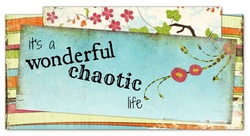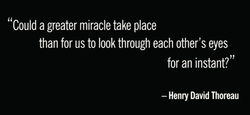|
Relationships can be incredibly complex and difficult. There have been times in my life when I deluded myself into thinking my relationship with someone was entirely different than it actually was. I had this idealistic view of how things should be and so I ignored how they really were, and forced myself to overlook the very clear signs that the relationship was not right, nor was it healthy. The mind is very powerful - and as long as peole around me were convinced all was good, my mind overcame the obvious and replaced it with the illusion the relationship projected. I have learned a lot from experiences like that, but it doesn’t mean I get it under control and stop doing it. I wish life were that simple. Sometimes I learn to change after making one mistake, but some habits - like how I view relationships are ingrained and hard to manage.
I was very recently deeply hurt by a person in my life who shouldn't want to hurt me. One of the things I have had to come to terms with is the idyllic relationship we should have, and the relationship we actually do have are two different things. I didn’t want to admit that, because it indicates a significant loss in my life, and the feeling that I failed somehow to live up to the terms of relationships so many other people deeply enjoy. So I have struggled mightily - and, as is my habit, blamed myself and my own shortcomings whenever things didn’t add up as they should. Things came to a head - and I ended up in a sharp and bitter conflict with the other person. I was expressing my very deep hurt, and I looked at the individual’s face and saw a slight grin - and realized my pain did not matter, there would be no life-change, and the relationship would never be what I hoped it could be or healthy as it should be. I found myself devastated, and felt like an utter failure. I couldn’t stop rehashing the events of the lengthy relationship - and the pain of the realizations that threatened to overwhelm me as I honestly assessed and tried to accept the enormous understanding that I cared more than the other individual was capable of caring. I woke up one morning, nursing my aching heart, and once again began thinking about the painful conflict and aching realizations. I made my breakfast and sat down to read my Bible. I am reading in the book of Genesis right now - the story of a man named Jacob - who was a man loved by God, but had some very rocky relationships throughout his life. When I finished reading, I made a decision that I was going to bring all of my hurt and disappointment to God in prayer, and I would not get up or stop praying until I was freed from the pain. It takes a long while to get rid of a lifetime of pain. But I prayed, and I stayed. And I was filled with so much love as I began to let all my expectations go. I acknowledged the hurt, and that it wasn’t my fault, and my heart grew lighter. I stayed for a long time, allowing God’s refreshing spirit and reassurance of His deep, deep, unchanging love for me to flood me and lift me and free me. I found peace, and God even gave me a very real and tangible sign when I finished praying - showing me HE cares about even the concerns in my life that seem small and insignificant. Nothing else in the world I have done has given me such complete peace, and such a great uplifting surge of self-worth. No relationship will ever satisfy as deeply. And what I have with God is exactly what it should be. He doesn’t disappoint. He doesn’t disappear. He doesn’t love others more than me. He doesn’t compare me with anybody else, even when I do. His steadfast love for me just as I am right where I am at fills me with peace and hope and understanding that even though human relationships fail, I don’t have to fail. Or quit. Or despair. I have love on a level that is not humanly possible to achieve, and, despite the fact human relationships often fall short and disappoint, my heart is healing and getting better every day, because I have Him and I have hope. It has been a difficult week, but I have once again been stretched and I have grown. How about you? How are your relationships going?
0 Comments
 From the beginning of time this has been a world of chaos. I can only imagine the very instant creation began, and it was this dark mass of waters and energy - just pulsating and powerful, waiting. And God’s presence was over all this nothing that was something, and He spoke and the chaos of energy and mass and water began to take form. I have been told repeatedly that God is a God of organization and order - to the point where, for a very long time I did not think He could really do much with me because my life is so often populated with chaos and craziness. As much as I would like to be able to neatly plan and label the circumstances of my life, it just doesn't happen according to plan. I have spent hours planning events and every other aspect of The Torch. Not one time has everything gone according to plan, usually it is according to chaos, and yet it works. My life has crossed paths with a plethora of people throughout the years, both young and old. And I have known many who have grown up and lived in a bubble of order. They have been protected from the chaos of the world and shielded from experiencing the consequences of their actions. Largely, this happens because they are not risk-takers, they are protected within the confines of their restricted environments and they don’t test the barriers or take leaps into the unknown. Following the path that has been laid out before them by the authorities in their lives, they play it safe, and safe they remain. They live serene and oblivious. That level of order and organization has never been mine, even though I tried really hard to make it happen. As I got closer to God, and started to understand His nature more, I realized it would actually make Him a lot easier to understand if He truly was just a God of order and organization. But, in reality, He is a God of everything, and that includes the chaos and chaotic people of this world. I used to know people who I hated visiting. Their house was immaculately kept - and you would have never known children lived there. I was nervous every time they invited me and my four kids over, because there was always a possibility something would get broken, or my kids would wander into an area where children were not allowed to be. For that family, it was a place of serenity and peace. For me, it was a little house of horror. Okay, maybe it wasn't that bad, but I cannot live in an immaculate environment. I need a sense of energy and vibrancy around me and if that means sometimes dishes are left out, and the carpet doesn't get vacuumed every day, it’s fine, because to me, those are signs of life and relaxation and feeling at home enough to let it all go for awhile.  There is a difference between having empathy for someone and having pity for them. Having empathy for someone is having the ability to relate to where they are. It is understanding, on some level, the pain they are going through - and being vulnerable enough to get involved with them as they suffer, and maybe even help them find a way through. Having pity for someone involves feeling sorry for them. It is far more helpful to people when our efforts to help come from empathy rather than pity. When my sister died suddenly, several years ago, I felt like the bottom fell out of my world. I was in such intense pain sometimes I couldn’t stop the tears from flowing. How was it possible I would never see her again? Talk to her? Laugh with her? I had never experienced such a profound loss - and I had never suffered so deeply. A few days after I learned of my sister’s death, a woman at church stopped me in the fellowship hall and asked for the details, and how I was doing. I told her what had happened and was searching for words to convey how I was doing when she said, “Oh well, she lived in California and you live in Michigan so you can’t possibly miss her that much.” I was stunned into silence at her seemingly callous dismissal of my pain. I literally could not open my mouth to say a single word. She went on her way, ignorant of the fact it felt like she had driven a stake into my heart. She clearly had never experienced a significant loss in her life - or if she had she had not allowed it to develop an empathetic spirit. She pitied me for losing a sister, but could not empathize with my pain. Pity is not helpful. For years I have worked with individuals who have a variety of disabilities. One of the hardest lessons I had to learn early in this job path was my pity would do them no good. When I start to feel sorry for someone - I try to do too much to make up for his or her misfortune. I end up in a position of superiority over them, and there is a subconscious drive to keep doing more and more for them. Pity works more for my benefit because it makes me feel better without really helping those I want to help. It fosters a sense of dependence on me and robs them of their independence and ability to help themselves.  I was told the other day I am a Caligander. I think that is funny, and true, which makes it satirical I suppose. I had no idea when I moved from California to Michigan in 1989 what life would hold. I was in for culture shock in a variety of ways. I learned hard lessons and gained experiences and knowledge that blessed and challenged me both. Until I moved to Michigan, I didn't know I did everything in a rush. I pushed hard to quickly get through chores, exercise, shopping, planning, even recreational activities. Not long after I moved to Michigan somebody asked me why I was always in such a hurry. I was surprised to hear that I was. I didn't know. I think that was a Cali-culture characteristic. Except for driving on the freeway, life in California moved faster than life in Michigan. I grew up always in a hurry to get to the next step, the next activity, the next whatever. When I was a child, my southern grandparents frequently asked me to repeat myself. They claimed they couldn't understand me because I talked so fast. I learned to slow down in Michigan and that was good for me. As Captain Obvious knows - the weather in California and Michigan are different. There were two kinds of snow I had experienced while growing up in California - there was one, yes, I said ONE afternoon in my entire childhood in which light rain sprinkles changed into snowflakes for about fifteen minutes. My sisters and I danced in the snow and hoped to make a snowman, but we were disappointed to see the snowflakes melt the instant they touched the ground. It left a lasting impression on me, though. We lived in the San Gabriel Valley, and the other snow I experienced was the snow which fell on the mountaintops in the surrounding San Gabriel Mountain range. Once, when I was a child, my dad drove us up the mountain in his pickup truck. We filled the bed with snow and brought it down into the valley and spread it all over our front yard. We were the cool kids in the neighborhood that day! I seriously had no idea what living in snow country was really like. God surely protected me and the other drivers on the road the first Winter I lived in Michigan. Who knew it was possible to put the brakes on and not stop? I didn't know tree leaves could do anything more than dry up and fall off. They actually turn amazing shades of red, orange, yellow, pink, purple, and green! There are certain roads I love to drive on during fall just so I can be covered with a canopy of brilliant colors. I love that my kids have grown up knowing this great beauty and treasure of nature. I never knew one could experience pure, overwhelming joy at the sound of frogs waking up in early Spring. It is the sweetest music to my ears - because it is the sound of life, and it never ceases to fill me with excitement and happiness. I literally pull my car over with my windows down whenever I pass an area in which the frogs are particularly vocal.  As I sit early in the morning, I am refreshed from spending time with God. As I relax and watch the warm sun rise, I think about a game I used to play with my sister Debbie. We grew up in the San Gabriel Valley of Southern California - and in case you didn't know - it gets HOT there. We lived in Glendora, which is right at the base of the San Gabriel mountain range. Valleys are not as flat as you might picture them - at least not in California. Our community was populated with a variety of foothills all around. In fact, one of the main roads through Glendora is named Foothill Avenue (also known as Route 66, just so you know). Right down the street from our house was a park called South Hills Park. The park itself was very small, but it was nestled among some rather tall foothills. My sisters and I loved going to the South Hills park and hiking and climbing around and exploring nature in the hills. It would get pretty hot doing all that climbing - and often when Debbie and I were done - we ran the two blocks home to grab glasses of water. That’s where the game came in. We would “torture” ourselves with the water and see who could hold out longest from taking a drink. We would hold the glasses just a few inches away from our lips and wait - no matter how dry our throats were or how parched our tongues. We would sit and torture ourselves. One day, when we were adults, we were sitting by a poolside watching our kids swim. Debbie said, “Do you remember torturing ourselves with water?” I said, “Yes. Why did we do that?” Debbie said, “I don’t know. It seemed like a good idea.” I think about how often I have done things that seemed like good ideas, but in reality, were not. One time I tried eating grass - I was thinking how awesome it would be to be able to eat grass just wherever I was and not have to go make food. Not a good idea. Another time, I was working on a project at school (I was in fourth grade). I had glue all over my fingers, and didn't want to mess up my project. I licked the glue off my fingers. Expedient, but definitely not a good idea. The brakes in my car felt a little soft once when I took off to head somewhere. I decided to ignore it. That did not work out well for me, either. Those are some of the smaller examples. But as I reflect over my life - and particularly when I think about torturing myself for no good reason - I realize I have tortured myself on a spiritual level as well. I was a young mom when I fell on the floor one night and gave my life to God, entering into what I realized was the most amazing relationship ever. My life changed. My heart changed. I felt it, and I knew it. I was a different person - and for the first time in my life I started to like myself. But for a good ten years, I tortured my spirit and soul. I was on a spiritual starvation diet. I prayed intensely about two times each week and got my Bible time in on Sunday mornings at church. Sure, I heard people - pastors and others - talk about the importance of reading my Bible and praying every day, but I didn't really consider those activities for me. Those were for missionaries and pastors and really religious people.  It is difficult to admit we need people in our lives. Our culture contributes to that - we are independent, free spirits. We don’t like to let others into our personal bubbles, and we certainly don’t want them to know when we are hurting or need some help and support. We are shamed into keeping our mouths shut, putting up walls, and donning smiley-faced masks. Such shame is misplaced. Instead of being ashamed of the fact we struggle, make mistakes, and face heart-wrenching situations - even if we brought them on ourselves - we ought to actually feel shame that we have become apathetic to the pain of those around us. We need people. Even introverts like me need people in their lives. I draw emotional strength from my times alone - and that will never change - but I have learned I need to let people behind the walls. I need to talk and be heard and to listen and care about others. I get into so much trouble when I try to go it alone. We all do. Sharing our heartache with someone else makes the unbearable a little easier. Hearing their pain allows us to participate with them as human beings in a difficult world. Talking through stresses about money, jobs, children, fears, parents, anger, sadness, illness, depression and every other thing that plagues us can sometimes help us figure out viable solutions and can almost always help to lift our spirits. We need to know we are not alone. When we really talk to and pray for each other we connect on a deeper level. When we pool our resources, we can do so much more than when we keep ourselves isolated and try to get through life alone. One of the things I admire about Sarah is one of the greatest lessons I have watched her learn through the past several years. There was a point when she was deeply hurt by leadership in a church. Not only did the church leadership hurt her - family was involved as well, and that quite nearly destroyed her. One of the results of that was she found herself homeless and depressed. Sarah is a strong and independent woman - an Army veteran, even - and her initial instinct was to shut out the world and draw into herself. She could have stayed that way and forcefully, by her own anger, pain, will and personal strength, pulled herself through and turned her life around - or she could have allowed bitterness to keep her stuck right where she was at. Those were paths she could have chosen. But she didn't. People reached out to help her, and she resisted at first. I understood her lack of trust - if you lose trust in church and family, who else is there? But then, she made a choice - she dropped her guard and started allowing people to help. I know it was a struggle for her, but by allowing God to use people to help her out she found peace, and her faith was strengthened - and the testimony of her life has given her a stronger foundation for establishing and leading The Torch. I believe we are created to need others, and if we resist letting them in and try to do life alone, we will never find the peace and fulfillment we should have - and it will much more difficult to get through the rocky times of life. Sometimes it takes a hard lesson to learn that. |
AuthorRhonda Callanan Archives
February 2022
Categories |

 RSS Feed
RSS Feed